

Diets for a Better Future - Scientific Report - EAT Knowledge. Diets for a Better Future demonstrates the leading role G20 countries can and must take to realize the exponential changes required for a healthy and sustainable world.
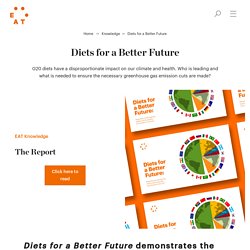
The report explores what a more equitable distribution across a global ‘carbon budget’ for food could look like. This report by EAT investigates current food consumption patterns and the efficacy of national dietary guidelines in G20 countries compared to the Planetary Health Diet. Through it, G20 countries are presented with clear opportunities to lead reduction of greenhouse gas emissions and realize the health and related economic benefits of shifting toward more healthy and sustainable diets. Shifting National Dietary Guidelines Most food consumption patterns in G20 countries are not aligned with those of a healthy flexitarian diet and most national dietary guidelines (NDGs) are not ambitious enough to bring food systems within planetary boundaries, including limiting global warming to 1.5°C.
Science Contact. The state of food security and nutrition in the world 2020. Overview Newly accessible data this year made it possible to estimate hunger in the world with greater accuracy, including a revision of the entire series of undernourishment estimates for 13 countries, including for China.
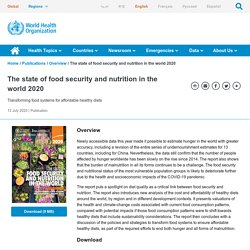
Nevertheless, the data still confirm that the number of people affected by hunger worldwide has been slowly on the rise since 2014. The report also shows that the burden of malnutrition in all its forms continues to be a challenge. The food security and nutritional status of the most vulnerable population groups is likely to deteriorate further due to the health and socioeconomic impacts of the COVID-19 pandemic. The report puts a spotlight on diet quality as a critical link between food security and nutrition.
Download In brief E-book Digital resources. Fao who sustainable healthy diets 2020. Nutrients, Foods, Diets, People: Promoting Healthy Eating. We use cookies to enhance your experience on our website.
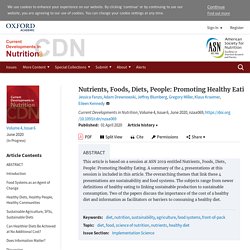
By clicking 'continue' or by continuing to use our website, you are agreeing to our use of cookies. You can change your cookie settings at any time. We use cookies to enhance your experience on our website.By continuing to use our website, you are agreeing to our use of cookies. You can change your cookie settings at any time. <a href=" Find out more</a> Skip to Main Content Search Close Advanced Search Search Menu Article Navigation Volume 4 Issue 6 June 2020 (In Progress) Article Contents. EAT Lancet Hebrew Report 230120. Food Waste, Healthy Diets, and Environmental Sustainability:... : Nutrition Today. The Myth of Cultured Meat: A Review. Introduction: Context Of Animal Farming Today The global population, 7.3 billion today, is expected to surpass 9 billion by 2050.
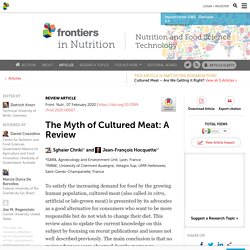
The Food and Agriculture Organization (FAO) has forecast that in 2050, 70% more food will be needed to fulfill the demand of the growing population, which is a great challenge due to resource and arable land limitations. Even if meat consumption is decreasing in developed countries, its global consumption is increasing because consumers are generally unwilling to reduce their meat consumption, in particular in developing countries such as in China, India, and Russia (1). These populations becoming more middle-class, they are looking for more luxury products, such as meat or other animal products (e.g., cheese, dairy products).
Innovation to Create a Healthy and Sustainable Food System: A Science Advisory From the American Heart Association. Food in the Anthropocene: the EAT–Lancet Commission on healthy diets from sustainable food systems. Food systems have the potential to nurture human health and support environmental sustainability, however our current trajectories threaten both.
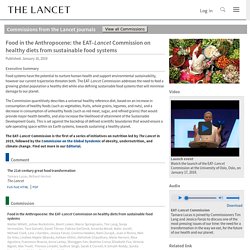
The EAT–Lancet Commission addresses the need to feed a growing global population a healthy diet while also defining sustainable food systems that will minimise damage to our planet. The Commission quantitively describes a universal healthy reference diet, based on an increase in consumption of healthy foods (such as vegetables, fruits, whole grains, legumes, and nuts), and a decrease in consumption of unhealthy foods (such as red meat, sugar, and refined grains) that would provide major health benefits, and also increase the likelihood of attainment of the Sustainable Development Goals.
This is set against the backdrop of defined scientific boundaries that would ensure a safe operating space within six Earth systems, towards sustaining a healthy planet. Efad sustainable health through life span 2019. How to feed a growing population healthy food without ruining the planet. By Alessandro R Demaio, University of Copenhagen; Jessica Fanzo, Johns Hopkins University, and Mario Herrero, CSIRO Rosemary Stanton is a Friend of The Conversation.
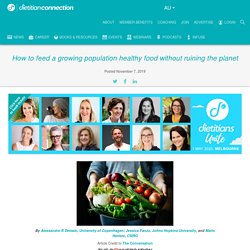
Article Credit to The Conversation How to feed a growing population healthy food without ruining the planet If we’re serious about feeding the world’s growing population healthy food, and not ruining the planet, we need to get used to a new style of eating. This includes cutting our Western meat and sugar intakes by around 50%, and doubling the amount of nuts, fruits, vegetables and legumes we consume. Climate Change and RDs – RDLounge.com. The International Panel on Climate Change recently released a special report, “Climate Change and Land,” which covers land degradation due to climate change, sustainable land management, global food security, and changes in greenhouse gases in land ecosystems.
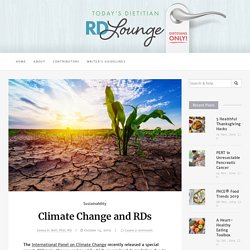
Top-tier media coverage on the report focused on its primary issue: Climate change is threatening the world’s food supply. Position of the Society for Nutrition Education and Behavior: The Importance of Including Environmental Sustainability in Dietary Guidance - Journal of Nutrition Education and Behavior.